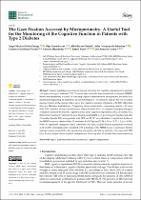| dc.contributor | Vall d'Hebron Barcelona Hospital Campus |
| dc.contributor.author | Ortiz Zuñiga, Angel Michael |
| dc.contributor.author | Simó Servat, Olga |
| dc.contributor.author | Rojano Toimil, Alba |
| dc.contributor.author | Vazquez-de Sebastian, Julia |
| dc.contributor.author | Castellano Tejedor, Carmina |
| dc.contributor.author | Hernández Pascual, Cristina |
| dc.contributor.author | Simó Canonge, Rafael |
| dc.contributor.author | Ciudin Mihai, Andreea |
| dc.date.accessioned | 2022-05-02T12:18:55Z |
| dc.date.available | 2022-05-02T12:18:55Z |
| dc.date.issued | 2021-08 |
| dc.identifier.citation | Ortiz-Zúñiga ÁM, Simó-Servat O, Rojano-Toimil A, Vázquez-de Sebastian J, Castellano-Tejedor C, Hernández C, et al. The Gaze Fixation Assessed by Microperimetry: A Useful Tool for the Monitoring of the Cognitive Function in Patients with Type 2 Diabetes. J Pers Med. 2021 Aug;11(8):698. |
| dc.identifier.issn | 2075-4426 |
| dc.identifier.uri | https://hdl.handle.net/11351/7424 |
| dc.description | Cognitive impairment; Retinal microperimetry; Type 2 diabetes |
| dc.description.abstract | Current guidelines recommend annual screening for cognitive impairment in patients > 65 years with type 2 diabetes (T2D). The most used tool is the mini-mental state evaluation (MMSE). Retinal microperimetry is useful for detecting cognitive impairment in these patients, but there is no information regarding its usefulness as a monitoring tool. We aimed to explore the role of retinal microperimetry in the annual follow-up of the cognitive function of patients with T2D older than 65 years. Materials and Methods: Prospective observational study, comprising patients > 65 years with T2D, attended at our center between March–October 2019. A complete neuropsychological evaluation assessed the baseline cognitive status (mild cognitive impairment, MCI, or normal, NC). Retinal microperimetry (sensitivity, gaze fixation) and MMSE were performed at baseline and after 12 months. Results: Fifty-nine patients with MCI and 22 NC were identified. A significant decline in the MMSE score was observed after 12 months in the MCI group (25.74 ± 0.9 vs. 24.71 ± 1.4; p = 0.001). While no significant changes in retinal sensitivity were seen, all gaze-fixation parameters worsened at 12 months and significantly correlated with a decrease in the MMSE scores. Conclusion: Retinal microperimetry is useful for the monitoring of cognitive decline in patients > 65 years with T2D. Gaze fixation seems a more sensitive parameter for follow-up after 12 months than retinal sensitivity. |
| dc.language.iso | eng |
| dc.publisher | MDPI |
| dc.relation.ispartofseries | Journal of Personalized Medicine;11(8) |
| dc.rights | Attribution 4.0 International |
| dc.rights.uri | http://creativecommons.org/licenses/by/4.0/ |
| dc.source | Scientia |
| dc.subject | Diabetis no-insulinodependent - Complicacions |
| dc.subject | Trastorns de la cognició - Diagnòstic |
| dc.subject | Ulls - Examen |
| dc.subject.mesh | Diabetes Mellitus, Type 2 |
| dc.subject.mesh | /complications |
| dc.subject.mesh | Cognitive Dysfunction |
| dc.subject.mesh | Diagnostic Techniques, Ophthalmological |
| dc.title | The Gaze Fixation Assessed by Microperimetry: A Useful Tool for the Monitoring of the Cognitive Function in Patients with Type 2 Diabetes |
| dc.type | info:eu-repo/semantics/article |
| dc.identifier.doi | 10.3390/jpm11080698 |
| dc.subject.decs | diabetes mellitus tipo II |
| dc.subject.decs | /complicaciones |
| dc.subject.decs | disfunción cognitiva |
| dc.subject.decs | técnicas diagnósticas oftalmológicas |
| dc.relation.publishversion | https://doi.org/10.3390/jpm11080698 |
| dc.type.version | info:eu-repo/semantics/publishedVersion |
| dc.audience | Professionals |
| dc.contributor.organismes | Institut Català de la Salut |
| dc.contributor.authoraffiliation | [Ortiz-Zúñiga ÁM] Vall d’Hebron Institut de Recerca (VHIR), Barcelona, Spain. Universitat Autònoma de Barcelona, Bellaterra, Spain. Servei d’Endocrinologia i Nutrició, Vall d’Hebron Hospital Universitari, Barcelona, Spain. [Simó-Servat O, Hernández C, Simó R, Ciudin A] Vall d’Hebron Institut de Recerca (VHIR), Barcelona, Spain. Universitat Autònoma de Barcelona, Bellaterra, Spain. Servei d’Endocrinologia i Nutrició, Vall d’Hebron Hospital Universitari, Barcelona, Spain. CIBER of Diabetes and Metabolic Disease, Instituto de Salud Carlos III, 28029 Madrid, Spain. [Rojano-Toimil A] Servei d’Endocrinologia i Nutrició, Vall d’Hebron Hospital Universitari, Barcelona, Spain. [Vázquez-de Sebastian J] Vall d’Hebron Institut de Recerca (VHIR), Barcelona, Spain. Universitat Autònoma de Barcelona, Bellaterra, Spain. Grup de Recerca en Envelliment, Fragilitat i Transicions, Vall d’Hebron Institut de Recerca (VHIR), Barcelona, Spain. Parc Sanitari Pere Virgili, Barcelona, Spain. [Castellano-Tejedor C] Grup de Recerca en Envelliment, Fragilitat i Transicions, Vall d’Hebron Institut de Recerca (VHIR), Barcelona, Spain. Parc Sanitari Pere Virgili, Barcelona, Spain. Grup de Recerca en Estrès i Salut, Departament de Psicologia Bàsica, Universitat Autònoma de Barcelona, Bellaterra, Spain |
| dc.identifier.pmid | 34442342 |
| dc.identifier.wos | 000689615800001 |
| dc.relation.projectid | info:eu-repo/grantAgreement/ES/PE2017-2020/PI20%2F01703 |
| dc.rights.accessrights | info:eu-repo/semantics/openAccess |

